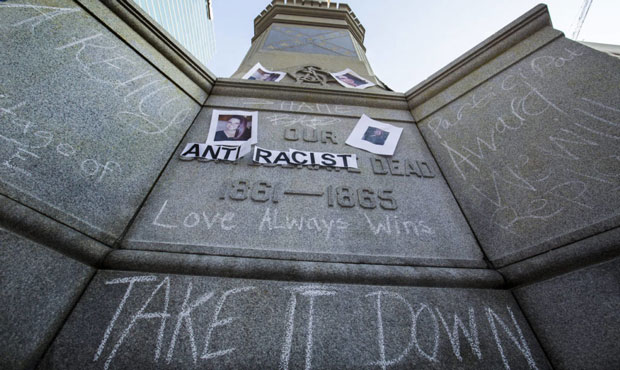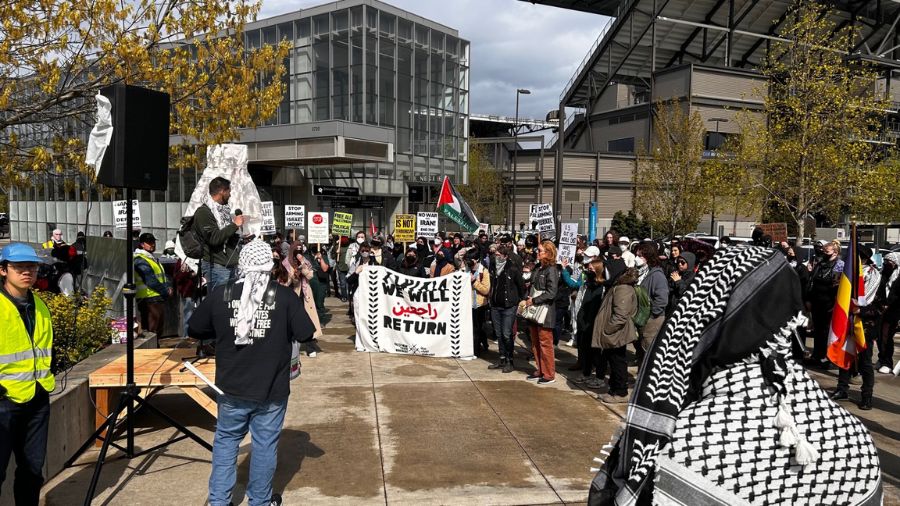Rob McKenna: Newest Confederate monument argument likely won’t work
Aug 22, 2019, 2:02 PM

During a protest calling for the removal of the Confederate monument in downtown. (Bill Tiernan/The Virginian-Pilot via AP)
(Bill Tiernan/The Virginian-Pilot via AP)
Free speech is often an argument for defending controversial pieces of art. But in a case stemming from Norfolk, Virginia, free speech is being used in an attempt to remove a Confederate statue.
“I think they will have a hard time with it,” former Washington State Attorney General Rob McKenna told KIRO Radio’s Dave Ross. “…That is a fairly novel argument. I don’t think it has been tested in court, and I don’t think it is going to be successful. Because there is a political option; there is a legislative option.”
Virginia’s battle over the 80-foot-tall pillar and bronze “Johnny Reb” statue in downtown Norfolk is pitting one government against another. The city of Norfolk’s council voted to remove the statue. But state law prohibits the removal of war memorials after they have been placed. McKenna notes that there have been many attempts to modify this state rule since the early 1900s, but the state Legislature usually enacts new laws to counter those efforts, keeping the Confederate statues in place.
Intertwined history of Washington and the Civil Way
But Norfolk has a new argument to try out.
“The city of Norfolk is claiming that the statute in state law, preventing them from removing this memorial, actually violates the city’s free speech rights because it forces the city to associate with speech they don’t agree with; so called compelled speech concept,” McKenna said.
The compelled speech concept is the same reason that people are not forced to say the pledge of allegiance if they don’t want to. Or in New Hampshire, people have the right to not have a license plate that states “live free or die.” But statues and memorials may be a bit different. McKenna notes that the Supreme Court has upheld in the past that permanent memorials are government speech and cannot be associated with compelled speech.
“Let’s say that you are really a big believer in dictatorship and autocracy and you really resent the Statue of Liberty in New York because it’s all about that terrible idea of freedom and liberty, so by gosh, you want to have a giant statue erected as a monument of autocracy and dictatorship. And if you don’t get to do that you would argue that your First Amendment rights are being violated.
“Well, that case would go nowhere, because the Supreme Court has held that an individual’s free speech rights, or even a group’s free speech rights, are not violated when a government refuses to put up a statue in a public place.”
Northwest and the Confederacy
Norfolk’s Johnny Reb statue was erected in 1909, an era when many such monuments were being built across the nation. The statue was built by the United Daughters of the Confederacy, who are also responsible for many such monuments in Washington state.
As KIRO Radio’s historian Feliks Banel has pointed out, the Northwest has a Confederate history of its own — a history echoes through today.
A Confederate monument at Lake View Cemetery in Seattle was erected in 1926. A tree was dedicated to Confederate General Robert E. Lee in Seattle Ravenna Park in 1909. Also in 1909, there was a Dixie Day on the University of Washington campus as part of the Alaska-Yukon-Pacific Exposition world’s fair.
Debating the Confederate flag in Washington
There have also been controversial debates over Jefferson Davis statues near the Canadian and Washington-Oregon borders. Davis was the president of the Confederacy. Those statues were eventually removed from public land and handed over to the Northwest’s chapter of the United Daughters of the Confederacy.
A private park was created where the UDC have placed these removed monuments. In fact, Washington’s Highway 99 was unofficially titled “Jefferson Davis Highway” for many years before officially being named after African-American Union soldier William P. Stewart.
Battle at Norfolk
McKenna argues that when Virginia’s monument case gets boiled down in court, the state’s free speech rights will likely overpower the city’s. The state is the governing entity that has purview over its cities.
“In order to remove this memorial you would need the state Legislature in Virginia, the commonwealth, to adopt a new statute allowing that particular memorial to be removed, or of course, the state could choose to repeal the statute which has been on the books for a long time that prohibits localities from removing war memorials.”
Another option, as Ross suggests, is for the city to place a plaque near the memorial stating that it does not support the sentiment of the Confederate statue.
“The state statute actually anticipates that,” McKenna notes. “It prohibits anything from being added to a memorial, either. You cannot add a Union insignia, or some sort of display about the Union winning the war at the base of the statue about the Confederacy, or vice versa. It’s really about protecting Confederate monuments, about an ‘I told you so’ declaration added to it.”
The city could put that statement across the street, however, away from the statue.














